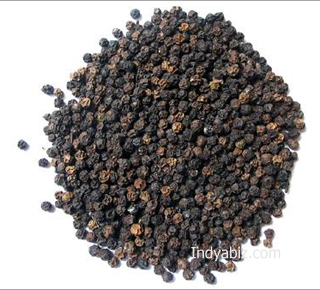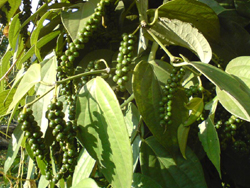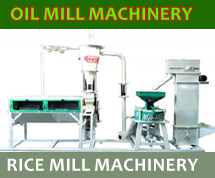 |
|
 |
|
Black pepper nutrition facts Incredibly popular black pepper, often referred as “king of spice” is a well-known spice since ancient times. The peppercorn plant is native to tropical evergreen rain forest of South Indian state, Kerala, from where it spread to rest of the world. The Pepper fruit, also known as the peppercorn, is actually a berry obtained from this plant.
 Botanically, peppercorn belongs to the family of Piperaceae of the genus of piper; and known scientifically as Piper nigrum. This perennial vine and climber requires supporting tree or pole to grow in height; thus has similar growth characteristics that of beetle leaf plant. It begins to bear small round berries after about three to four years of implantation. Technically, the pepper fruit is a drupe, measuring about 5 mm in diameter, containing a single large seed at its center. Several color peppercorns found in the markets are nothing but the same fruit, which picked up from the plant at different stages of maturity and subjected to different methods of processing. Generally, the peppercorns are harvested when they are half-matured and just about to turn red. They are then left to dry under the sun light that causes them to shrivel and turns black. Alternatively, green pepper corns are picked while the berries still unripe and green. The white peppercorns are derived when fully ripe berries soaked in brine to remove their dark outer coat, leaving the inner white-color pepper seed.
Black peppers have a strong spicy taste that comes to them from volatile-oils such as piperine. In ground peppers, these volatile oils may evaporate if kept open in the air for longer periods.
Cubeb or tailed pepper berries are dried unripe fruits of the Piper cubeba vine that is grown mainly Indonesian rain forest. They appear similar to black peppercorns but have a characteristic stalk which is often interpreted as a "tail." Cubeb berries have a distinctive flavor rich in monoterpene essential oil, cubebene.
Health benefits of black pepper
Peppercorns contain an impressive list of plant derived chemical compounds that are known to have disease preventing and health promoting properties. Peppers have been in use since ancient times for its anti-inflammatory, carminative, anti-flatulent properties.
Peppercorns are composed of health benefiting essential oils such as piperine, an amine alkaloid, which gives strong spicy pungent character to the pepper. It also contains numerous monoterpenes hydrocarbons such as sabinene, pinene, terpenene, limonene, mercene, etc., which gives aromatic property to the pepper.
The above-mentioned active principles in the pepper may increase the gut motility as well as the digestion power by increasing gastro-intestinal enzyme secretions. It has also been found that piperine can increase absorption of selenium, B-complex vitamins, beta-carotene, as well as other nutrients from the food.
Black peppercorns contain a good amount of minerals like potassium, calcium, zinc, manganese, iron, and magnesium. Potassium is an important component of cell and body fluids that helps controlling heart rate and blood pressure. Manganese is used by the body as a co-factor for the antioxidant enzyme, superoxide dismutase. Iron is essential for cellular respiration and blood cell production.
They are also an excellent source of many vital B-complex groups of vitamins such as Pyridoxine, riboflavin, thiamin and niacin.
Peppercorns are a good source of many anti-oxidant vitamins such as vitamin-C and vitamin-A. They are also rich in flavonoid polyphenolic anti-oxidants like carotenes, cryptoxanthin, zea-xanthin and lycopene. These compounds help the body remove harmful free radicals and help protect from cancers and diseases
.  Selection and storage
Black Peppers are available year around. In the store, buy whole peppercorns instead of pepper powder since, oftentimes it may contain adulterated spicy powders. The peppercorns should be wholesome, heavy, round and compact.
Peppercorns can be stored at room temperature for many years and can be milled using hand mill as and when required. It can be kept in the refrigerator for up to a month or so. Powdered pepper should be stored in the refrigerator in airtight containers.
Medicinal uses
Peppers have been used therapeutically in dentistry as an antiseptic for tooth-decay and gum swellings.
Peppercorns are also being used as traditional medicines in treating flatulence and indigestion, however, there is little or no data to support these claims in modern medicine.
See Also Health Benefits of Watermelon Seeds, 8 ways to a healthy blood pressure, ways to control high blood pressure without medication, ARJUNA A HEART SAVING TREE, Flax seed nutrition facts, Cashew nut nutrition facts, Health Benefits of Brown Rice, Aloe Vera Juice The New Miracle Drink, Super Health Benefits of Sesame Seeds, Home Remedies for High Blood Pressure, 10 ways to control high blood pressure without medication, Almonds nutrition facts, Health benefits of Walnuts, Health benefits of black pepper, Surprising Health Benefits of Cinnamon, Explore the health benefits of garlic, Health Benefits of Drinking Green Tea, Amazing Health Benefits of ginger, Health Benefits of Turmeric, Best Fruits for Losing Weight, Eating Regularly To Lose Weight, Benefits of Clove in our day to day life, Health Benefits of Neem, Benefits of the Holy Basil (Tulsi), Health Benefit of red Chillies, Healthy Diet Habits, The healthiest way to lose weight , 10 Benefits to Drinking Warm Lemon Water Every Morning, Health Benefits of Apricot, Benefits of Honey in Weight Loss, Health Benefits of Indian Gooseberry or Amla, |
|
|
|
|
|
|
|
All Rights Reserved. Indyabiz.com







